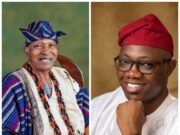The United States of America is currently the epicentre of global coronavirus pandemic. With more than 142,000 people dead and over 3.8 million confirmed coronavirus cases, I contracted the coronavirus and survived it. I guess that’s why I am able to tell my story.
When the pandemic initially began to rage across the world in March, I had asked myself an honest question: If I were to have the virus, am I healthy and strong enough to survive it? I had no underlying health issue. I was fit and certainly looked younger than my chronological age. I thought my odds were good.
When a national lockdown was imposed in April, keeping most people indoor, I was the only one in my household that had to go to out regularly because of the nature of my job. But I knew that every time I step out of the door, I was being exposed to the virus despite the face mask that I steadfastly wore, the hand sanitizer and disinfectant I used often and all the other precautions I took. I had to interact with people, mingle and share restrooms and other common areas with co-workers whose health status I did not know. I also sometimes had to engage in shopping where I had to touch carts and items which other people had previously touched. Some of the people I came across wore masks. But I also saw many others who refused to wear one.
But my concern was less about myself and more about not bringing the coronavirus home to my wife and kids. I began to make preparation to strengthen my immunity. I began to engage in physical exercise more, spending time on my treadmill, carrying weights occasionally and going for long walk four times a week. I also began to engage in dieting, taking more vegetables and acidic fruits than before. As a family, we also took hot lemon tea almost on a daily basis, used ginger and turmeric in cooking more. It was like preparing for war, except that this was a different type of war essentially centred on fortifying our bodies. The regular praying time in the house also took more time.
We installed hand sanitizer in different areas in the house. No one goes out without a face mask. I even bought a box of gloves to avoid contamination when anyone ventures outdoor. I began to avoid a lot of my co-workers, sequestering myself in my office with the door firmly closed and only venturing out occasionally to use the restroom.
Despite all my best efforts, I still contracted coronavirus. I am still at a loss about where and how I got it or who gave it to me. One day, I woke up in the middle of the night and I felt severe body ache from head to the bottom of my feet. I have never felt like that before, not even when I used to have malaria fever back to back in Nigeria. In the morning, I took painkiller and felt relieved.
I checked my temperature to see if it was a fever. It was 97 which was below the fever threshold of 104. The pain returned in the afternoon and was like that for about a week. My friend, Emmanuel with whom I often trekked and whose wife is a medical doctor thought it was probably because I had done less physical exercise. He suggested we engage in more trekking at work. But the more trekking I did, the more pain I felt. Again, I checked my temperature. I did not have fever. What is the problem? Have I suddenly become incredibly old overnight and begin to experience some of the signs of old age? I had no concrete answer to the questions that agitated my mind.
I decided to book an appointment with my physician. Surely, he should have an idea of this unusual terrible pain ravaging my body. After booking the appointment, I decided to inform two of my out of town medical doctor friends who had been my close buddies since our days at the Obafemi Awolowo University in the 1980s. Dapo in Minneapolis and Wale who lives in New York suggested that I should go for coronavirus testing. I objected because I did not have any of the well-known COVID-19 symptoms. I had no cough, no fever, no chill, though I did feel the occasional shortness of breath occasionally. After some persuasion, I agreed when they began to throw up too many medical jargons.
I did not believe that I had coronavirus. But I registered for the test online, nonetheless. I went for the drive-thru coronavirus test on Friday, June 19, 2020. While still in my car, I was asked to roll down my window and the health practitioner in full hazmat suit extended a long stick the test materials to me which was just a swab, small bottle in a nylon packaging. I was instructed to put the swab in my nose and moving it around my nostril for 15 seconds. I returned the swab which I had placed in the oblong bottle placed in the nylon packaging by the same way I had received it. The whole thing took about 10 minutes.
Two days later which was Sunday and happened to be Father’s Day, I was checking my emails when I saw the result of the test. It stated that I was positive. I read it twice for my mind to adjust to the new reality. I was still thinking about it when my wife and the kids came into my room to wish me Happy Father’s Day. I quickly told them to back off so that they would not come too close. They took the news of my health status badly. I could see fear and apprehension enveloping my house.
I called my physician to announce the bad news and to ask him if needed to be hospitalized. He suggested that I should quarantine at home and that if my health worsened, I would have to check myself into a hospital. The idea of being hospitalized and placed on a ventilator did not appeal to me. The following Monday, I called my workplace and I was immediately placed on administrative leave while taking care of myself. My wife and kids as well as a few of my friends that I heavily interact along with their families had to go for COVID-19 test to ascertain their health status. It turned out that I who had taken extreme measures was the only one that had it.
That was how my 14-day quarantine began. The doctors recommended vitamin C, zinc, vitamin D, Omega 3 as well as painkiller if I ever needed it. In addition, I was advised to eat mainly protein diet, lots of vegetables and fruits, particularly lemon, drink a lot of water, get fresh air and a lot of sleep. That was how I spent 14 days sequestered in my room with only my wife having access to me and eating out of disposable plates. I was never used to going on holidays, having spent most of my adult life as a journalist with a frenetic schedule that did not leave much time for rest or vacation.
I don’t know which was worse: Battling coronavirus and dealing with the body ache or having to stay in one place for two weeks, mainly sleeping, eating, watching TV, and fiddling with my phone and doing virtually nothing else. I could not even write as my wife took away my laptop. I slept so much that back ached. But it was probably the kind of respite my body needed at this point.
Within a week, I no longer had body ache and even the little manifestation of shortness of breath was gone. At the end of my self-isolation,
Then one day, I began to experience.
Abiodun Raufu, PhD, a former MD/EIC of Nigerian Tribune, is now based in the USA teaching At University of Texas Southern University


































